America's first drag queen was a former slave and LGBT rights crusader, says historian
William Dorsey Swann was 'The Queen' of a secret world of drag balls in Washington, D.C., in the 1880s


Channing Joseph was a journalism student at Columbia University when he stumbled upon an unusual Washington Post headline dated April 13, 1888: "Negro Dive Raided. Thirteen Black Men Dressed as Women Surprised at Supper and Arrested."
That headline led Joseph to uncover the story of William Dorsey Swann, a former slave who reigned over a secret world of drag balls in Washington, D.C.
"People throughout the centuries have cross-dressed for all sorts of reasons," Joseph told Day 6 guest host Saroja Coelho. But Swann's was the earliest instance he could find of anyone referring to themselves as the queen of a drag event — or drag queen.
Joseph, whose book The House of Swann: Where Slaves Become Queens is due out in 2021, travelled to national archives in D.C., Maryland and elsewhere around the U.S., to piece together Swann's story, which to date had only survived in snippets, like brief newspaper reports.

'I define him as an activist'
Swann was born into slavery in Maryland at around 1860, just a few years before African American slaves were freed when Abraham Lincoln signed the Emancipation Proclamation.
He describes it as "a time of excitement and danger" as the Ku Klux Klan rose to prominence, but black men were also being elected into office.
"There were lots of things that seemed possible that had not seemed possible during the slavery era. And I think that there was a level of excitement and possibility that drove Swann and his group to consider how they could express themselves and flout the norms of their society," he said.
Swann attended drag balls held by the formerly enslaved black community in D.C., who gathered in secret out of fear of police raids and imprisonment, despite there being no specific laws against cross-dressing at the time.
While no images of Swann have survived, Joseph says that records describe him as wearing long silk or satin dresses and opulent accessories, earning himself the nickname "The Queen."

Joseph explains in an article for The Nation that Swann was charged in 1896 for running a brothel — a false charge in lieu of holding a drag ball. Swann lobbied for a presidential pardon, but was denied and sentenced to 10 months in jail.
It wasn't the only time he would cross paths with the law; he was jailed for stealing silverware and party supplies in 1882.
One newspaper report described him clashing with police attempting to shut down a ball. Joseph says it's one of the first known instances of violent resistance on behalf of the LGBT cause, nearly 100 years before the Stonewall Riots.
"He's taking the first steps that we have documented in resisting the authorities' efforts to clamp down on an openly queer group. Because of that I define him as an activist," explained Joseph.
Despite unearthing the widely unknown history of Swann and his drag ball scene, Joseph doesn't want to suggest it should supplant the importance of the Stonewall Riots in the American history of LGBT resistance.
Rather, he sees it as a necessary precursor to subsequent queer movements, in a time before language like LGBT became commonly known.
"Swan's period was really a time of crafting, understanding and creating an identity. And that was a necessary component before Stonewall was possible — before, as a community, we could rise up and say these are the rights that we now are demanding," he said.
The cake-walk
Themes of resistance were also seen at the balls themselves. Joseph painted the picture of a popular event known as the cake-walk.
"If you can imagine: mistresses walking around with tight corsets, their masters walking around with top hats and stiff backs and canes and so on. The enslaved people perceived them as ridiculous, you know," he said.
Participants danced in a contrived, stilted manner meant to mock their masters' "pretentious manners." Judges would award the winner with a cake.
Joseph says the balls Swann share parallels "with the modern ballroom culture, voguing balls and beauty contests that we see today" — or even a modern episode of RuPaul's Drag Race.

The underground balls, clashes with the law and challenging of gender norms might seem especially daring for people who had just escaped enslavement.
But Joseph says they may have felt there was no better time to do so.
"If you can imagine having lived through slavery, and having had no reason presented to you that slavery would ever end, and then all of a sudden it does, I think that you're left with a strong sense that no matter what you face in life that there are possibilities for immense radical change that you might have never expected," he said.
Written by Jonathan Ore. Interview produced by Pedro Sanchez.
To hear more from Channing Joseph, download our podcast or click Listen above.